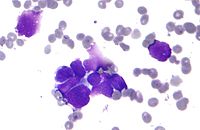
Photo from wikipedia
Primary peritoneal serous carcinoma (PPSC) is defined as a high-grade malignant neoplasm with widespread peritoneal involvement in the setting of normal-sized ovaries that contain small surface tumoral implants and no… Click to show full abstract
Primary peritoneal serous carcinoma (PPSC) is defined as a high-grade malignant neoplasm with widespread peritoneal involvement in the setting of normal-sized ovaries that contain small surface tumoral implants and no other identifiable source of malignant serous neoplasm elsewhere in the gynecologic tract. The aim of this case report is to contribute to the understanding of tumor immunophenotype and describe the behavior of a primary peritoneal serous carcinoma in relation to the conversion of the tumor’s WT1 immunohistochemistry expression from positive to negative after chemotherapy. This is a case of a 72-year-old female that presented with a history of increasing abdominal girth of 12 months. She underwent biopsy of the omentum and was diagnosed to have metastatic carcinoma that was positive for WT1, PAX8, CK7, and ER. The patient was initially diagnosed and managed as a case of ovarian serous carcinoma with metastasis to the omentum. She underwent neoadjuvant platinum-based chemotherapy and en-bloc total abdominal hysterectomy with bilateral salpingo-oophorectomy and low anterior resection, with metastasis resection. The criteria of PPSC were fulfilled due to the normal-sized ovaries and minimal ovarian involvement with normal fallopian tubes. Immunohistochemistry of the resection specimen showed negative WT1 and PAX8, and positive ER, CK, and p16 expression, with null p53 expression. Following the concept that WT1 expression portends a poorer prognosis, the loss of WT1 expression may be a positive response to the chemotherapy and should be correlated with the time to recurrence. The patient was noted to be recurrence free for 1 year and still does not show signs of the disease at present. This is the first documented case of a previously WT1-positive primary peritoneal serous carcinoma that converted to a negative WT1 expression. This may provide insight on the role of chemotherapy in silencing protein expression.
Journal Title: American Journal of Clinical Pathology
Year Published: 2019
Link to full text (if available)
Share on Social Media: Sign Up to like & get
recommendations!